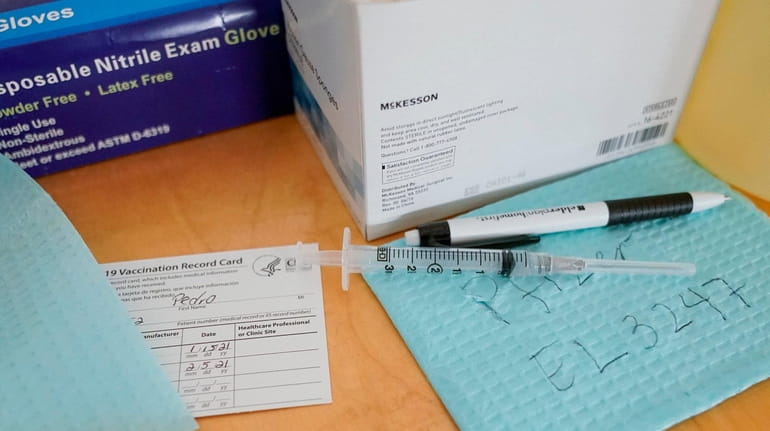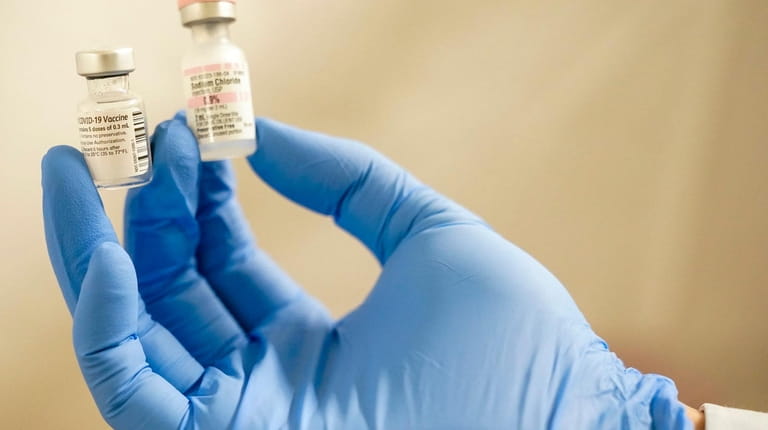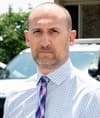People seeking COVID-19 vaccines must prove eligibility, officials say

A syringe filled with the Pfizer-BioNTech COVID-19 vaccine is seen alongside it's batch number and a patient's vaccination card at a vaccination site at the Corsi House in the East Harlem on Jan. 15. Credit: AP/Mary Altaffer
More than 7 million New Yorkers are now eligible to receive the state's scarce supply of the COVID-19 vaccine. But how will state officials ensure that the vaccine only goes to those who are currently eligible and that others don't jump the line?
Officials insist they have strict controls in place to ensure that those receiving doses of the vaccine are eligible under the state’s criteria, including providing proof of age, address and employment. But others suggest the system's registration system is potentially vulnerable to fraud and abuse. Here are some key questions:
What is the system in place to prevent those who are not eligible from getting the vaccine?
What is the system in place to prevent those who are not eligible from getting the vaccine?
Guidance issued by the state stipulates that if an individual is eligible due to their work status, they must provide proof such as an employee ID card or badge, a recent pay stub or a letter from their employer.
Individuals 65 and older who are eligible because of their age must bring a government-issued ID with their date of birth, such as a driver’s license or passport. And everyone must prove they are a state resident by showing either mortgage or lease documents, school records or current mail.
"DOH has issued strict guidelines on ensuring that those who are receiving vaccine doses are eligible under the state’s criteria, including verifying eligibility," a state Health Department official said.
Do I need to upload those documents when I register for an appointment with the state?
Do I need to upload those documents when I register for an appointment with the state?
No. These documents are not required on the front-end screening process to determine eligibility. Rather, those forms must be brought to the vaccination appointment where they are scanned by officials on-site.
Could individuals who are not eligible for the vaccine still potentially make an appointment?
Could individuals who are not eligible for the vaccine still potentially make an appointment?
Potentially, yes. For example, some have suggested that individuals who previously worked as a college professor or grocery store clerk — both among the professions eligible to obtain the vaccine — could maintain proof of employment long after leaving that job, potentially allowing them to obtain a shot before it was their turn.

A pharmacist holds a vial of Pfizer-BioNTech COVID-19 vaccine, left, alongside the a vial of saline solution it will be mixed with at a vaccination site at the Corsi Houses in the East Harlem on Jan. 15. Credit: AP/Mary Altaffer
"The idea of someone gaming the system to get ahead of the line would be aggravating and infuriating but is a byproduct of the state not having a system fully ready to roll out," said Bill Hammond, a senior fellow for health policy at the Albany-based Empire Center for Public Policy, a conservative Albany-based think tank that has been critical of the Cuomo administration's vaccine rollout plan. "Vulnerability to fraud is a legit issue."
What else is the state doing to prevent fraud?
What else is the state doing to prevent fraud?
A State Department of Health official said many qualified individuals, such as health care workers and first responders, are being vaccinated at their place of employment, adding another layer of screening. Some unions are also organizing vaccination programs for their members, creating lists of those to be inoculated in priority order, officials said.
What is the punishment for individuals getting the vaccine when they are not allowed?
What is the punishment for individuals getting the vaccine when they are not allowed?
When individuals submit eligibility forms they are signing an attestation indicating they are qualified to receive the vaccine, the Health Department official said. Those caught lying could be charged with filing a false instrument, a misdemeanor punishable by up to a year in jail.
In addition, health care providers who fraudulently obtain the vaccine, or knowingly vaccinate someone not in a priority group, could face up to $1 million in fines and lose their state license, Gov. Andrew M. Cuomo said last month as he signed an executive order setting the strict penalties.
Has the state caught any fraud yet?
Has the state caught any fraud yet?
To date, no charges have been levied in New York regarding vaccine eligibility, the Health Department official said. But the State Attorney General's Office is investigating Brooklyn-based ParCare Community Health Network for possible fraud in how they received vaccines from the state and administered them to some members of the public in violation of state guidelines.
Sign up for COVID-19 text alerts at newsday.com/text.

